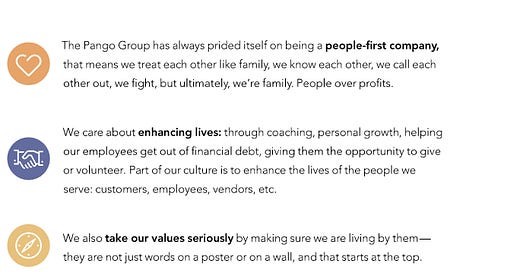Culture is one of those things that every company and every team has — but not every team is intentional about defining what their culture is. When you’re not intentional about defining your culture, it can define the company, and sometimes that definition is not what the leadership or the employees want.
At our company, The Pango Group, we wanted to create a culture with the following five components.
People First. "People before profits." We make people-based decisions, and when we run a profitable company we have the freedom to make unprofitable people decisions. We disapprove of the words “corporate” and “management,” because those words imply to us that we put the organization above all else… when in reality we want to balance the needs of the company with the needs of its people. And when push comes to shove, we normally choose people.
Enhancing Lives. This is really about investing time, effort, energy, and resources into making the people and communities we’re in better. Be it coaching, giving, or advice, we want our people to not only have a place to work but also be better for being here.
Living By Our Values. Do what you say and lead by example. Anyone is allowed to call the leadership out if they feel we’re not 100% committed to living by our values. No exceptions. We hire to these values and fire if these values are not being met. Our Values are: Teamwork, Integrity, Grace & Kindness, Forward-Thinking, Knowledge, and Moxie.
Escrow First. We do a lot of things as a company, we have a lot of business interests, but at our core we’re an escrow company. It's our main competency and has been for over 25 years, and it will remain our core business. We build businesses that help support the settlement process of real estate transactions. Obviously, not every company is an escrow company. The point is this: Know who are you. Don’t try to be something you’re not.
Results Oriented. What gets measured gets managed. When we set goals, we want to know if we accomplished them, and if not what we can learn to be better next time. You can't do that without measuring and then holding accountable the people that were involved in setting the goal. As mentioned, we’re not 100% about hitting a profit number, but we sure want to set specific goals and know whether or not we had the impact we wanted. We believe you can be both people-focused and results-oriented. Great companies do this. We’re a great company.
Here’s a sign we posted in every office.
What would your team say are the components of your company’s culture? What would you say? Are they different?
Same questions for your sales team….




